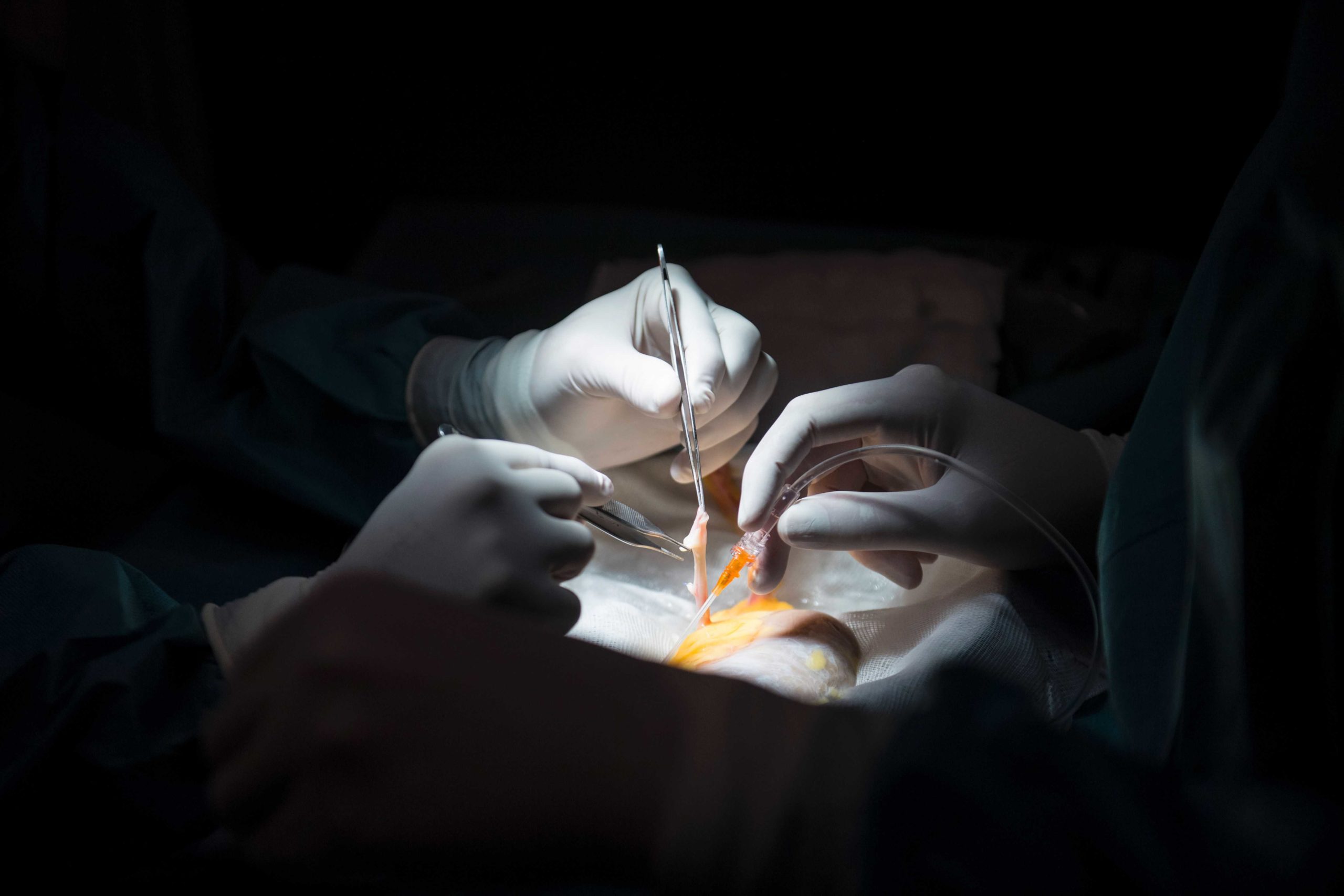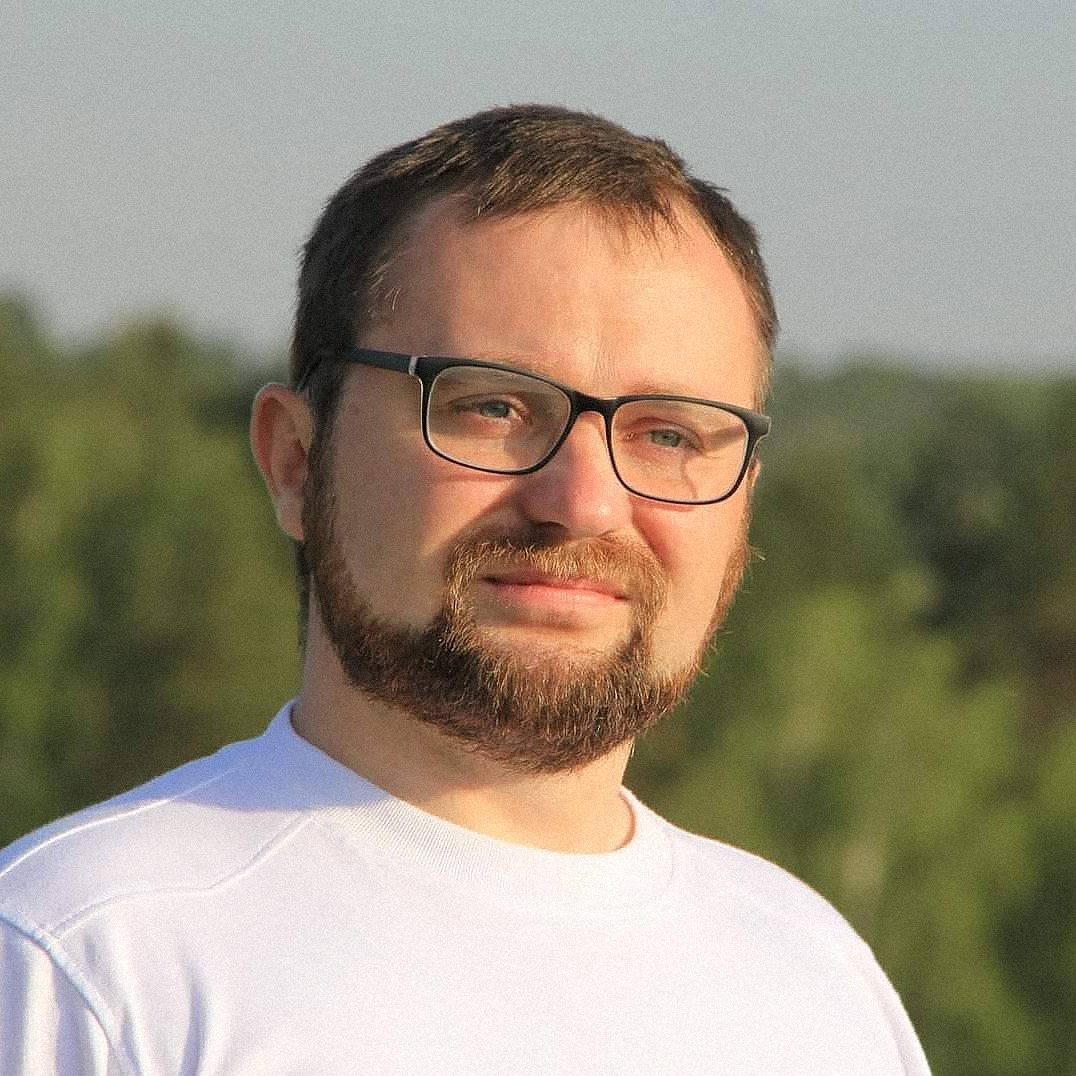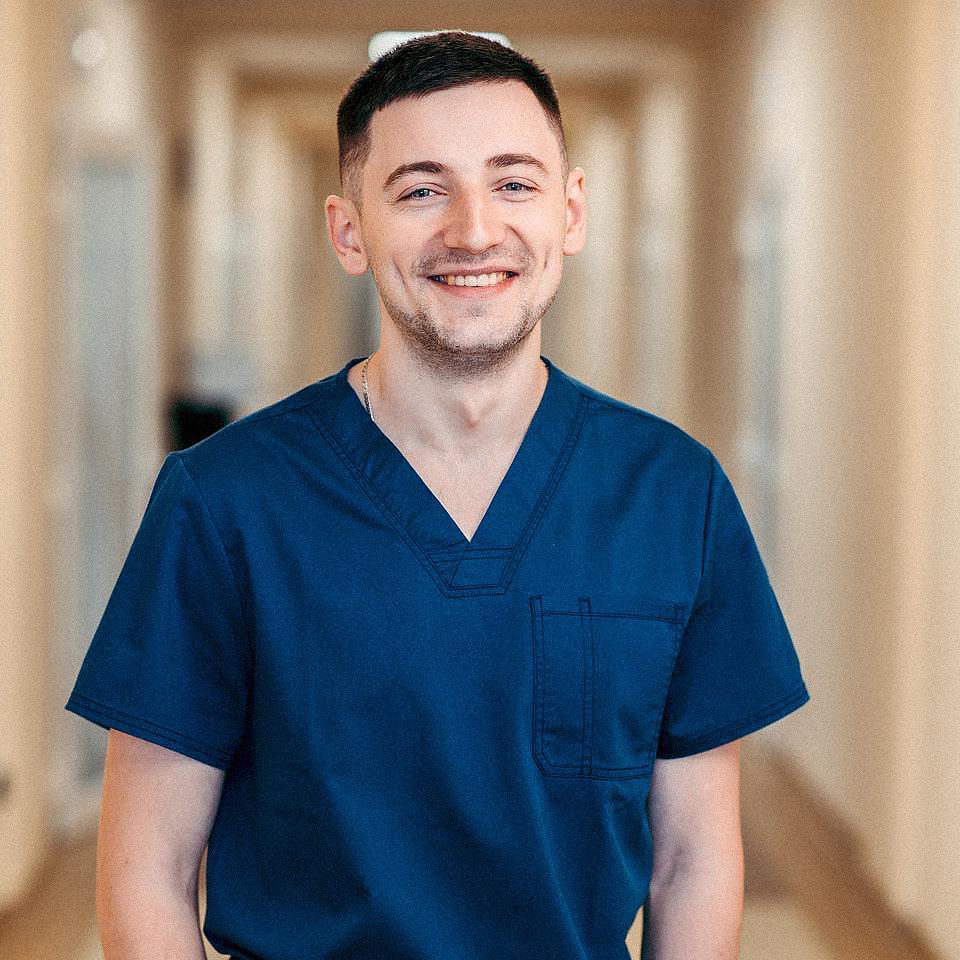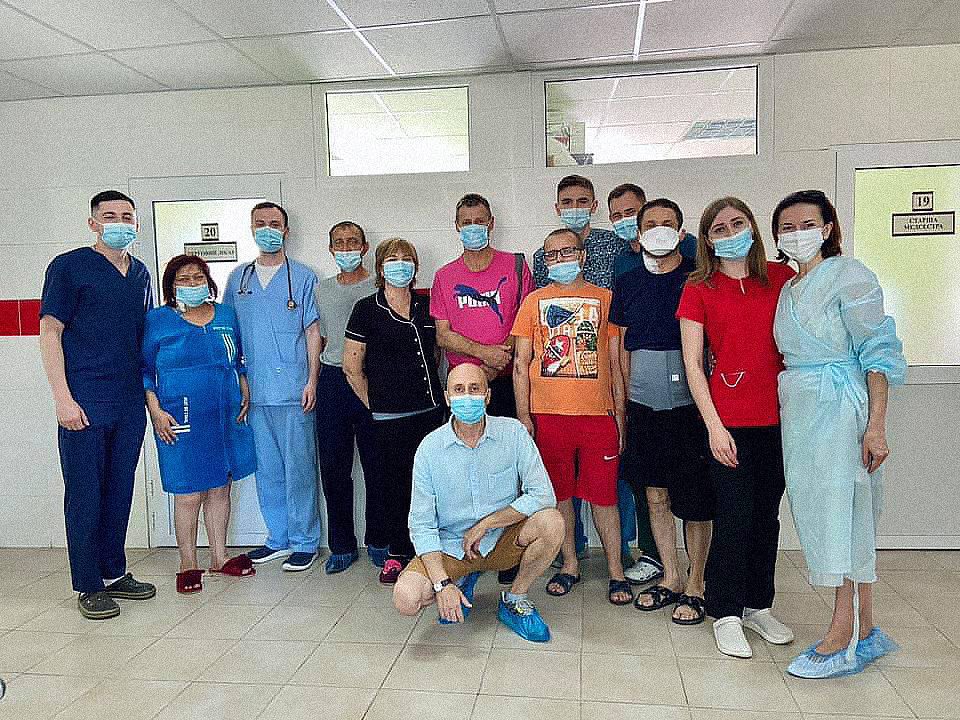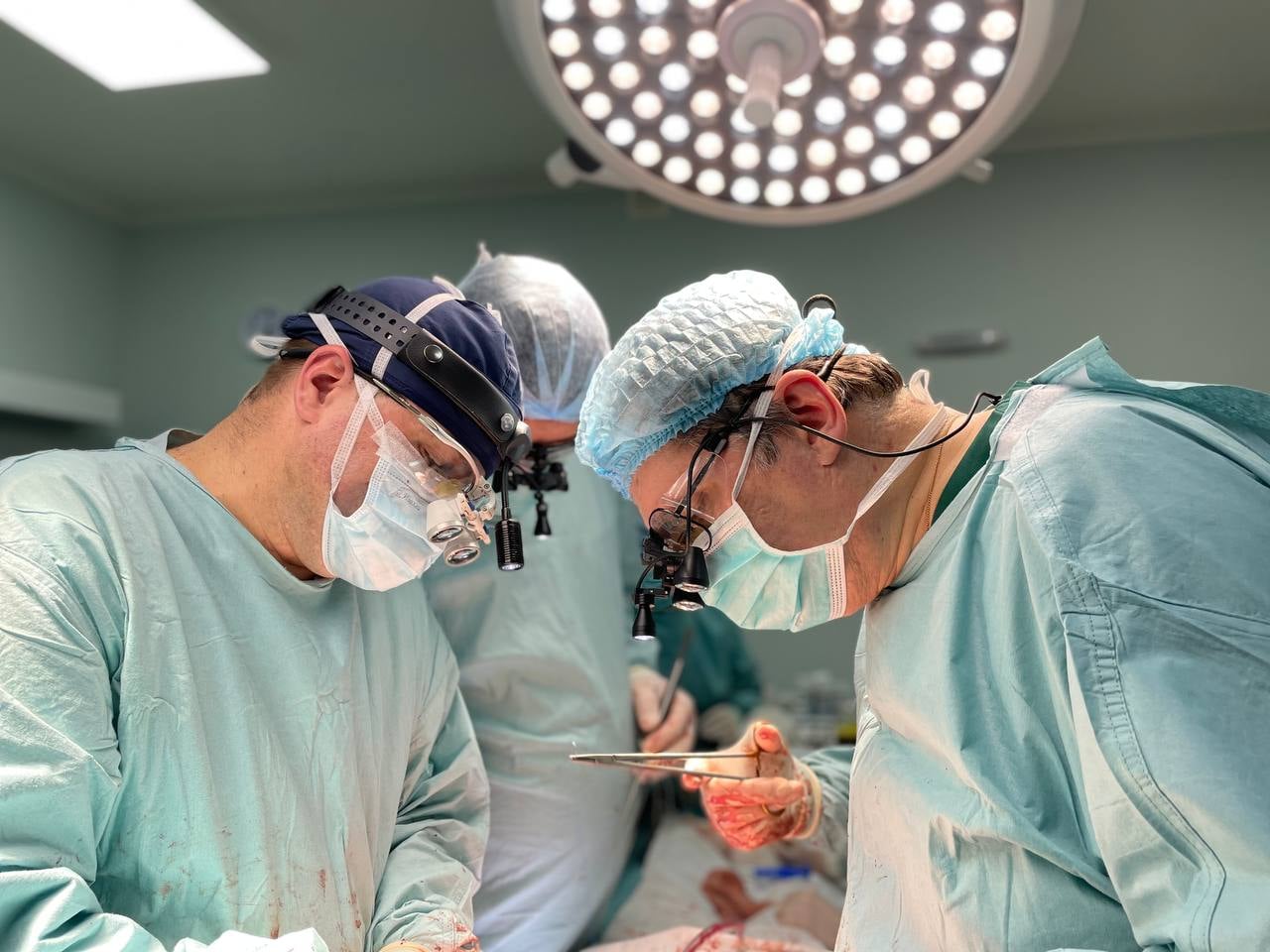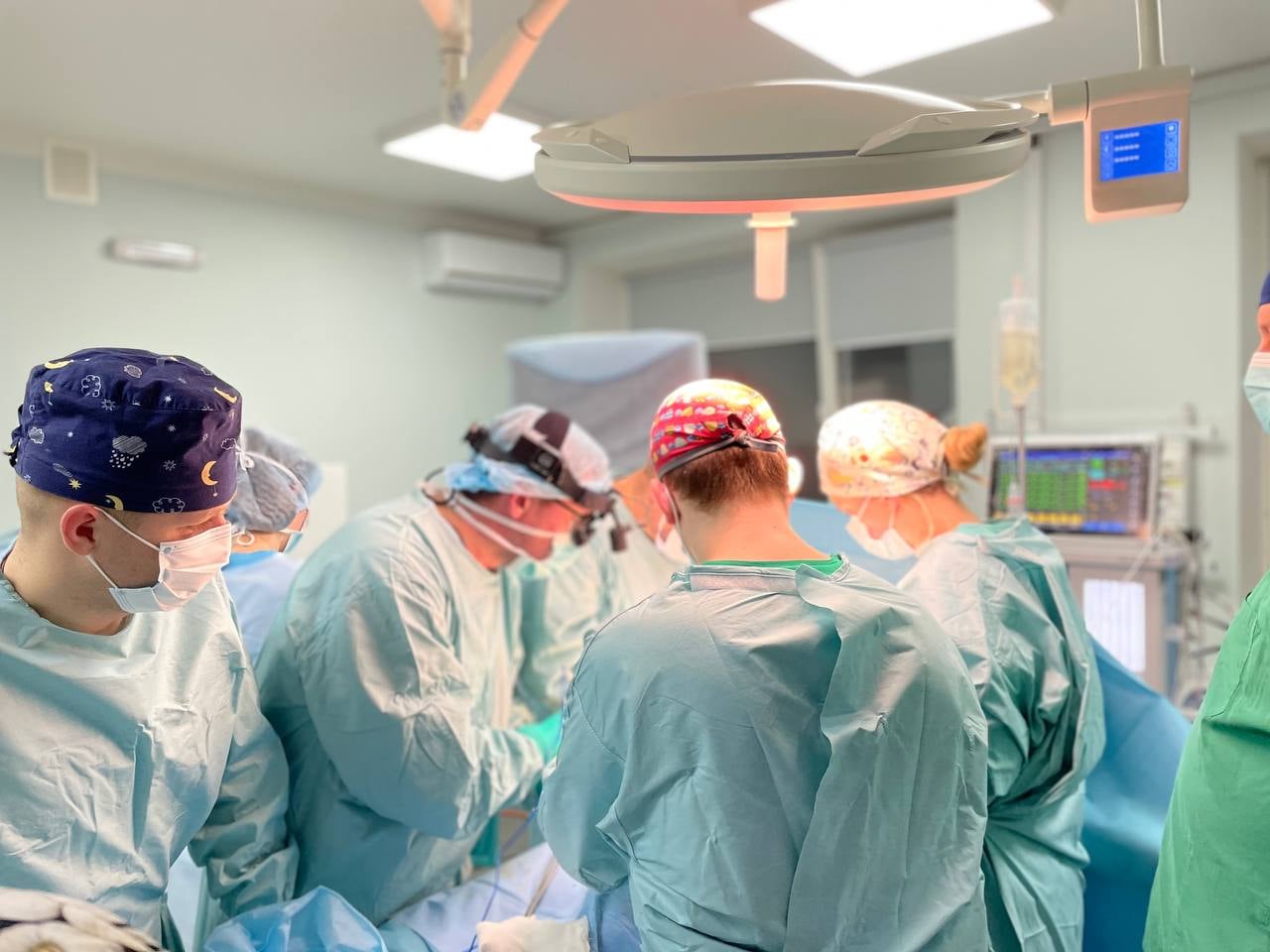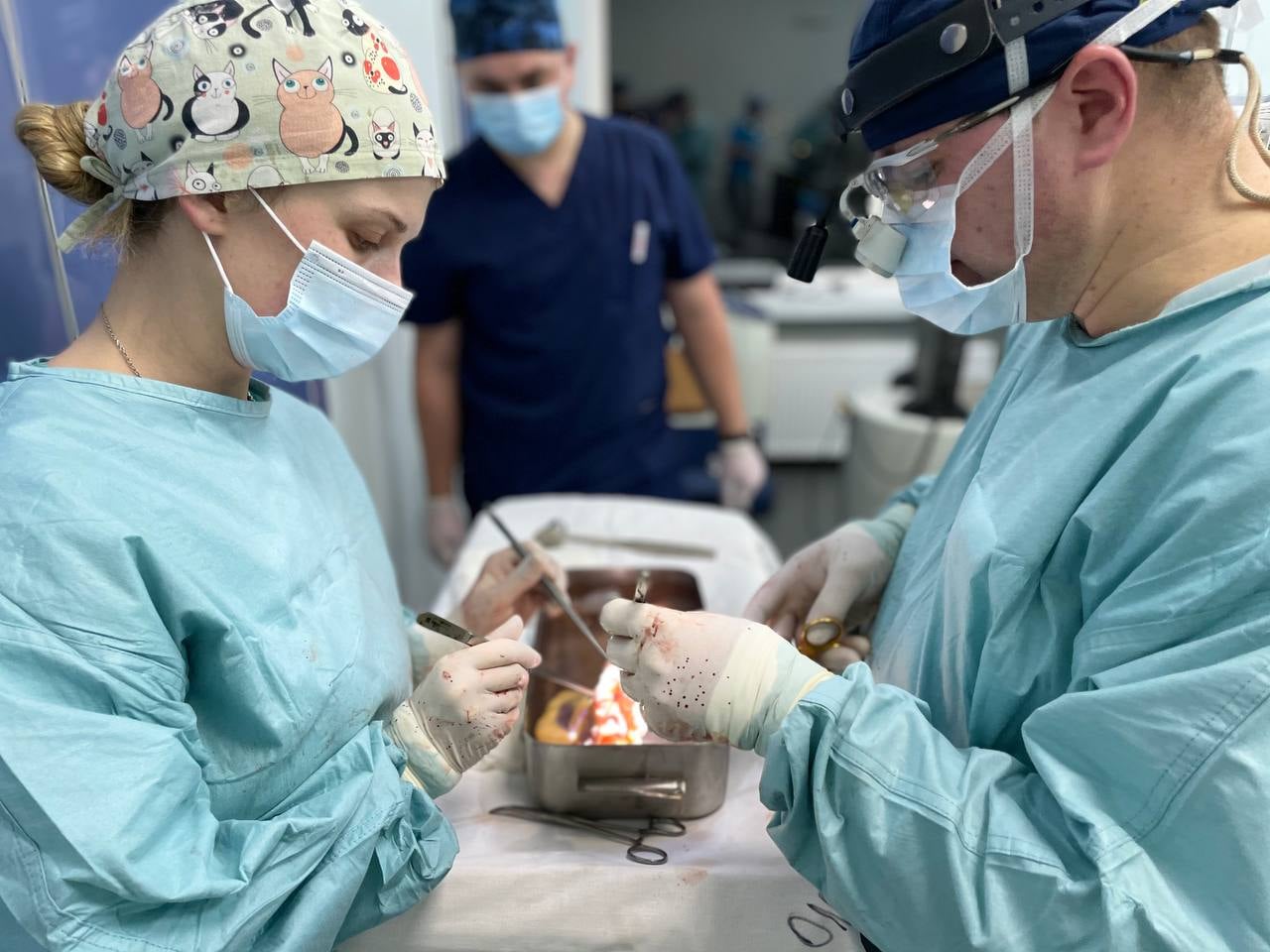For all of its years of independence, Ukraine has been unable to create its own system for organ transplants. For decades, Ukrainians have been forced to go abroad for life-saving organs. Over the last five years, Belarus became a sort of “organ transplant hub”. However, because of the current political situation in Belarus today, bilateral relations with Ukraine have seriously deteriorated: diplomatic relations are tense, while air traffic between the two has been closed: it’s practically impossible to receive an organ there. Zaborona journalist Anna Belovolchenko explains what people do when they need a transplant, why you can’t simply go to another country for a new heart or liver, and how a regional hospital has begun building this system in Ukraine to the enthusiasm of doctors.
“There might not be a next time”
In March 2017, the life of couple Olha Kredenets and Vasiliy Vyspyanskiy changed dramatically. 42 year old Vasiliy has no vices, is athletic, and has steadily worked in the transport industry – but then he suddenly found himself on dialysis, regularly undergoing a procedure to clean his blood because of his kidney’s underperforming. Vasiliy was diagnosed with glomerulonephritis, a kidney disease that causes the organ to shrink and stop working.
‘It’s probably the consequences of a sore throat that he experienced and worked through in 2007,” his wife Olha told Zaborona. “The disease is very insidious and develops slowly, and we, who rarely in our lives went to the doctors, didn’t even suspect that something like this could happen.”
Over the years, Vasiliy’s health worsened. Closer to 2017, he suddenly lost weight. It got to the point where he would feel nauseous just from drinking water.

Olha Kredenets
“For a long time, the hospital couldn’t figure out what the problem with him was. And when they diagnosed him, they said that we needed to find a donor. Without explanation. And we had no idea how to do that. Are you supposed to go out with a banner in Lviv, or what?” Olha recalls tearfully.
The couple lived in agony for the next six months. They traveled to Krakow in hopes that the diagnosis wouldn’t be confirmed. But alas. They had hoped to get away from dialysis, so they grabbed for any additional drops or dressings they were advised to get. But no one has gotten off dialysis that easy. Relations with the Lviv medical university, remembers Olha, were basically cold and apathetic: it was hard to talk to the doctors there, and explanations or practical advice was hard to come by. They only learned about a national health program to treat Ukrainians abroad from a fellow patient: the state budget pays for operations in another country. It turns out that you would need a thick file of documents to enter it – and then you can go abroad for an organ transplant. But to where?
“I was choosing between a lot of options: Poland, Austria, India, Belarus, Turkey…in Poland they said that we would never make it in their line, so they’d give us an organ only as a fifth choice. First – their own citizens, then E.U. citizens, then those who have residency there, a Poland card. Foreigners get it last, and it’s not guaranteed that the donor and recipient data will match,” Olha explains.
Considering the cost of treatment in far-away countries, the only option remaining was Belarus. Olha herself chose a hospital in Brest, because this city is the closest to Lviv. She spoke to doctors there herself. The clinic submitted a ready-made package of documents to the Ukrainian Ministry of Health. They confirmed that her husband could undergo the procedure, and set out some typical requirements: full pre-pay in the amount of around 55,000 EUR. The funds were transferred in just a couple of days.
“We didn’t have any problems crossing the border. After the elections [in 2020], Belarus began to check very thoroughly, but never forbid transit. We had a great relationship with the hospital. You didn’t have to run around for doctors, like here, everything was clean and sterile – there was a feeling that you were in Austria somewhere,” Olha says.
Vasiliy has been on the transplant list since 2018. Every three months, he had to cross the border for his blood serum to be collected. These procedures, costing around 250 EUR each time, were paid for out of pocket. But there was no way around it. The serum data provides a basis to say whether the donor matches or not. The serum itself is kept frozen for all three months. If a single serum collection is skipped, the patient is removed from the transplant list.
“When we went to Belarus in May of this year, the border guards asked us more questions, demanded that we show them our marriage certificate – which we don’t have. But we were let through in the end. I asked if I needed to bring along the certificate next time – but I was told that there may not be a next time. Without any sort of explanation,” Olha remembers.

A kidney transplant, Spain. Photo: Pierre-Philippe Marcou / AFP / Getty Images
Traveling for organs
Going abroad for organs is a common story in independent Ukraine. If you need bone marrow – transplant lists in Turkey, Israel, Spain, or Germany are open. If you need a heart, a liver, kidneys, or lungs? Then you have a straight road to Belarus or India. The cost of an organ transplant isn’t cheap. For example, for a kidney in Belarus today, you’ll have to pay over 62,000 EUR, and for a heart – nearly 94,000 EUR. In 1992, the Ukrainian government created the State Program for the Treatment of Ukrainian Citizens Abroad in order to provide ordinary citizens with some kind of access to these operations. For example, according to data collected by the Center for Social-Economic Research Ukraine (CASE Ukraine), from 2010 to 2014, the state paid for the treatment of 40 people, and in 2015 – 84, while in 2021 the government has budgetary expenditures planned for the treatment of 450 people, with the average cost of a treatment being set at about 75,000 EUR. But this isn’t enough.
There are no official counts of how many Ukrainians need transplants, explains Yuriy Andreev, the chairman of the National Movement for Transplants NGO. There are only estimated numbers, provided by doctors from their local medical facilities – about 5,000 a year. That’s why, based on the calculation of 75,000 EUR per patient, Ukraine must annually transfer about 375 million euros abroad, which is more than 7% of the current budget for the entire healthcare system. But even that isn’t a guarantee of saving people’s lives.
India has stopped providing transplants to Ukrainians in 2018. The reason was their change of government. According to Andreev, nationalists came to power there, who decided that Indians should be first in the transplant lists, and the rest would get one only after that. But Ukrainians aren’t the only ones coming to India for organ transplants, and it’s not clear in what order and who is getting transplants.
“When India stopped conducting these operations, there were 19 Ukrainians on their waiting lists. Eight of them were waiting in India itself. Over three years, six zinc coffins have returned to Ukraine instead of living people – they simply didn’t get their organs in time. Ukraine didn’t get its money back either,” Andreev says.

Yuriy Andreev
The money in question is nearly 1.8 million EUR, which have been left on the balances of these Indian clinics. The Ministry of Health has stated that they’re managing the situation, but there has been no more word about these cases – meanwhile, the Ministry team itself has changed. Zaborona contacted the Ministry of Health about the fate of these funds, but did not receive a response by publication time.
As a result, for Ukrainians who hope for help from the state in regards to organ transplantation, neighboring Belarus has remained almost the only option. Organs can’t wait for a patient forever. For example, a heart needs to be transplanted within four hours – otherwise, the heart will simply be nonviable. That’s why when recipient and donor data match, automated systems give the organ to whichever recipient is closer, because that minimizes the chances of the organ being nonviable. It’s realistic for Ukrainians to reach Belarus by car or by plane in this timeframe. Belarusian waiting lists currently contain the names of 342 Ukrainians. Ukraine has paid for 18 of those patients – for a total sum of 31.3 million EUR. However, Ukrainian authorities halted air travel between the two countries on May 26, 2021. The government made this decision after Belarus unilaterally forced a Ryanair plane to land, in order to arrest opposition journalist and ex-editor of the NEXTA Telegram channel, Raman Pratasevich. Ukraine was following the E.U.’s lead, in order to “ensure the safety of flights” and to put pressure on the Lukashenko regime. However, the decision has had its consequences: those who have already left for organ transplants and those who remained on the waiting list are “stuck” in Belarus.

The Center for Organ Transplants at the University of Akdeniz, Turkey, 2021. Photo: Mustafa Ciftci / Anadolu Agency / Getty Images
Patients are often found in critical conditions after a transplant, and their lives can be threatened by even the smallest infections. That’s why travel by land-based transport is difficult and risky. In order to get home after a liver transplant. Kharkiv resident Anna Kurylova had to find a specialized critical care transport: she couldn’t handle the twenty hour bus ride home. She had to look for help from the Kharkiv regional government and local councilmembers. The Ukrainian embassy in Belarus says that every situation is unique, which is why they only consult and help those who go to them directly, when they can.
The people still on the waiting lists still have to travel to Belarus every three months for tests – otherwise they’ll be removed from the lists, Andreev explains. But it’s an open question whether these people will be allowed across the border.
“The Ukrainian government needs to talk to the Belarusian authorities and receive guarantees that the people on the waiting list can definitely have their operations – in order to avoid how it was in India,” believes Andreev. “If there are no such guarantees, then it will become necessary to raise the question of bringing the people and the money back to Ukraine. We, you know, don’t even know what sort of quota Belarus has for foreigners. They first provide organs to their citizens, and then everyone else. And there are people like Russians and Kazakhs getting treatment there. How do we know when it’ll be a Ukrainian’s turn?”
The Ministry of Health insists that the money will be returned if the operation isn’t handled, or if the person receives an organ in a different country. These kinds of things are accounted for.
But Yuriy Andreev thinks that Ukraine should have long ago stopped financing transplants in foreign countries, and should focus on building its own organ transplant system within the country. Especially when such an opportunity arose after 2019/.
“Regional”
Olha and Vasiliy had their hopes pinned on Belarus for a long time. But that situation changed two years ago.
On December 25, 2019, a difficult conversation was held within the walls of a small regional hospital in Volyn region, in the town of Kovel. Not long before that, a man with a severe traumatic brain injury was brought in. It wasn’t possible to save him – medical personnel named him brain dead. Now, the mercy of relatives and the carefully chosen words of doctors would decide whether the deceased would be able to save the lives of others and become an organ donor posthumously. In Ukraine, when it comes to organ donors, there’s a presumption that consent is not given – this means that by default, a person is assumed to have not agreed to be an organ donor. Only relatives have the right to change that situation. And on Christmas Day in Kovel, they did that. After only four hours after the documents had been signed, the donor’s body lay on an operating table in this regional hospital, and three patients received his organs: two received kidneys, one – a heart. Back then, in 2019, Ukraine conducted its first heart transplant in 15 years.
This sensational organ transplant in a Kovel hospital was only possible thanks to the enthusiasm of local doctors. For all of Ukraine’s independence, organ transplants were something of a fantasy, even though there was no law forbidding it.
“The problem was in the fact that in the law [adopted in 1999] there was no procedure for transplantations,” explains the head of the Center for Transplantology at the Lviv Clinical Hospital of Emergency Care, Maksym Ovechko. “As a result, any mistake in the patient’s medical history could be interpreted as a violation of this order. This threatened doctors with criminal responsibility, which is why they were scared to do this.”

Maksym Ovechko
Yet this team of Kovel medical professionals “were seized with the idea to do something global in a regional hospital.” They wanted to do it – and did, notes Ovechko. They had trained for ten months for the first transplant: and in order to receive a medical license for their clinic, it took half a year.
And the moment they transplant that first kidney from an unrelated donor, it got easier. Over five months of the team’s work, they transplanted nine kidneys and two hearts. And in 2020, it got even easier – on December 29, 2019, Ukrainian president Volodymyr Zelenskyy signed into law a new set of rules on transplantation.
Now, most of the medical professionals from that Kovel team work in Lviv. They were invited in by Lviv mayor Andriy Sadovyi, in order to organize the work of the emergency hospital there and open a Transplant Center on its grounds. This was actually the hospital in which Vasiliy got his new kidney. The moment Ukraine started performing organ transplants, he joined the waiting list and was first. After a year and a half, he had his operation.
“I was amazed at the level of the doctors, their communicativeness, their relations. Maksym Ovechko called us on May 31, 2021, at 8:20 p.m. And within an hour we were in an ambulance, and my husband had his operation at 1 in the morning. The team answered all of our questions, they were always smiling – we couldn’t even believe that we were in a Ukrainian clinic,” says Vasiliy’s wife, Olha.
Today, Vasiliy is undergoing rehabilitation. He’s still required to take a host of medications in order for his body to not reject the donated organ. But thanks to Ukrainian doctors, he’ll live.

Seven patients saved thanks to organ transplants, standing with doctors from the Lviv City Clinical Hospital of Emergency Medical Care. Photo: Lviv City Clinical Hospital of Emergency Medical Care / Facebook
Death and consent
The transplantation law adopted in 2019 prescribes the procedure for organ transplants. First, doctors have to establish that brain death has occurred with the help of specialized equipment, if the hospital has access to it. Then – they check in the Unified State Information System for Organ and Tissue Transplantation if the person had agreed to be an organ donor when they were alive. If they did, then the transplantation procedure can be carried out for whomever matches. If not, the doctor can ask for consent from the deceased’s relatives, though the doctor isn’t obliged to. And it’s in those two factors – ascertaining brain death and relative’s consent – that specialists see the brakes coming on to Ukraine’s development of an organ transplant system.
“80% of hospitals simply do not have access to the equipment that can help ascertain brain death. They would need to buy it using local budgetary funds [the necessary equipment for a single hospital costs anywhere from $7,500 to $11,000], but generally, on the ground, it doesn’t come to that,” says Yuriy Andreev.
The other factor – getting a relative’s consent for the transplantation. According to Ovechko, it’s easier for doctors to conduct ten operations than once speak to the relatives of the deceased. The law states that this has to be done by a transplant coordinator – a medical specialist who not only has to talk to the relatives of the potential donor, but ensure the organization of the process as a whole: from consent to the transfer of the organ to a transplantation department.
“These specialists don’t exist in 90% of hospitals. And in the ones that do have them, the transplant coordinator often cannot explain all the nuances of the case,” relays Ovechko. “Then doctors of different specialities join this process, in order to explain from a scientific point of view what brain death is and why it’s equal to biological death. But people are suffering from a grave loss in those minutes. And it’s hard to explain to them that a big gesture can be made – to save two or three other patients. Many just refuse, some react aggressively and nearly accuse us of selling organs. Our society is not quite ready for donorship.”
Both of these factors add up to a colossal deficit in organs from posthumous donors, Ovechko continues. According to the specialist, the current demand for kidneys adds up to one and a half thousand per year. For the first six months of 2021, Ukraine conducted only 120 kidney transplants. There was a need for 500 livers, but only 20 were transplanted. At least 400 hearts were needed, but only a few dozen were transplanted. Lung transplants in Ukraine have not been conducted at all.
“These are 18 hour operations that provide lots of complications, seeing as the organ is in constant contact with the external environment – the person breathes air. And it’s hard to choose lungs: there must be a genetic match, size. Abroad, only 20% of donors who have their hearts taken have their lungs taken as well. For this, the person has to have led a healthy lifestyle and not have been hooked up to artificial lung ventilation for long periods of time, because that will make the organ nonviable. We have one or two donors a month in our hospital – there’s nothing to choose from,” states Ovechko.
Ukraine needs to work harder on popularizing organ transplants, as anyone can, while they’re still living, give consent to have their organs donated if they die. In order to do this, a person has to personally go to a hospital where they conduct transplants and write a request. This decision can be revoked at any moment, if a person changes their mind.
Making the organ transplant process better is not just good for those waiting for organs. Hospitals, financially, can benefit, seeing as they will receive funds for every conducted transplantation – and this is dozens and hundreds of times greater than any other operation. A year and a half ago, says Ovechko, the hospital received 12,500 EUR for a kidney.
“This money was very close, but it was enough for salaries, consumables, and all the medication for patients undergoing rehabilitation. In July, the government increased its financing, and now for that same kidney the hospital will be given 25,000 euros,” notes Ovechko.
This is good for the government budget, too, as organ transplants conducted abroad are always more expensive, and controlling what exactly the money is used for is difficult.
Transplantation necessity
Ukraine could be transplant-indepedent in five years, believes Maksym Ovechko. He bases this conclusion on the rate with which hospitals are increasing the number of operations today, the growth of specialists in this field, and technological progress.
For its half of year of work in 2021, the Lviv emergency care hospital became the second in Ukraine by quantity of organ transplants performed: they transplanted 26 kidneys, three hearts, and a single liver. In the future, there are plans to open a fully-fledged transplantation department.
30 hospitals across Ukraine today have received a license to transplant organs, but in reality, only a dozen actually perform the procedure: in Kyiv, Lviv, Kovel, Zaporizhia, and Rive. In comparison, 30 clinics in Germany specialize just in kidney transplants.

An organ transplant on the grounds of a Kovel hospital, 2021. Photo: A.A. Shalimov National Institute of Surgery and Transplantology / Facebook
“In Ukraine, it’d be enough for even a single hospital for two regions,” Ovechko says. “Ukrainians do not need to go across the border for organ transplants. There they will still remain foreigners, they will be of secondary importance. But here, they’ll be the first to receive organs. In addition, all of the medical personnel improve their qualifications thanks to transplantation: laboratories, emergency care, surgeons – because they’ll be conducting a high level operation.”
Ukraine will be able to provide organs for foreigners once it meets its own demand. At the moment, Ovechko says, you can find a recipient for any organ, as demand is high. In Spain however, a country considered to be the world leader in organ transplants, there often are not people who would match, for example, a liver. The waiting lists aren’t long there. That’s why Spain, and other European countries, have signed a memorandum which states that they can share organs that are unnecessary inside the country. If a situation like that arises, it’s entered into a unified European system and a recipient from another country is chosen.
Andreev believes that Ukraine could sign a similar agreement with its neighboring countries. However, there are still problems there – and not only with organs, but also with specialists.
“In Moldova, they conduct kidney transplants, but they don’t have any heart or lung specialists. They also travel to Belarus for bone marrow. Russia also doesn’t conduct all the operations and doesn’t cover its own needs,” Andreev says.
As it turns out, Ukraine has very little choice other than to develop its own organ transplant system at home. And this can be done if there are professional doctors, the popularization of donorship, good financing, and political will.
“We, for some reason, found billions of hryvnias for roads [this is in reference to the presidential program ‘Big Construction’, which oversees the reconstruction of 6,600 kilometers of roads in 2021], but we didn’t find money for equipment to ascertain brain death. Meanwhile, thousands of people wait for their operations,” notes Andreev. “Organ transplantation is a chance that has to wait, but not everyone has the time.”
Produced with the support of Russian Language News Exchange

